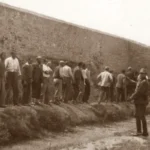Israel’s security cabinet has officially approved Prime Minister Benjamin Netanyahu’s plan to occupy Gaza City, a move confirmed by his office and seen as a major escalation in the ongoing conflict that has now lasted 22 months.
The decision follows a lengthy security cabinet meeting held in Jerusalem, which began on Thursday and extended into the early hours of Friday.
In a statement released this afternoon, the Prime Minister’s Office declared: “The Security Cabinet has formally endorsed the Prime Minister’s proposal aimed at the defeat of Hamas. The Israel Defense Forces (IDF) will prepare for the military takeover of Gaza City, while simultaneously ensuring humanitarian aid reaches civilians living outside active combat zones.”
The announcement outlined a comprehensive framework for what Israel terms the “end of the war,” which includes several key objectives: the complete disarmament of Hamas, the safe return of hostages—both alive and deceased—the demilitarisation of the Gaza Strip, and the establishment of an alternative civilian administration that would neither be Hamas nor the Palestinian Authority.
“The majority of cabinet ministers concluded that alternative plans presented would fail to bring about Hamas’s defeat or secure the release of abductees,” the statement added.
Gaza City, situated in the northern part of the Gaza Strip, is densely populated by hundreds of thousands of Palestinians, making any military action there highly sensitive and likely to have serious humanitarian implications.
Prime Minister Netanyahu indicated that Israel plans to assume military control over Gaza and subsequently hand governance responsibilities to “Arab forces.” However, he did not elaborate on which Arab countries might be involved or the precise nature of the governance structure envisaged.
In response, a senior Jordanian official, marking one of the first official reactions from a major Arab neighbor, strongly rejected Netanyahu’s proposals: “The Arab states will not accept Netanyahu’s policies nor take responsibility for cleaning up the consequences he has caused. Any political solution or security arrangement in Gaza must be determined by the Palestinians themselves through their legitimate institutions,” the official told Reuters.
As the cabinet convened, hundreds of protesters gathered near the prime minister’s office in Jerusalem, urging a peaceful resolution to secure the hostages’ release. Sharon Kangasa-Cohen, one of the demonstrators, expressed the sentiment of many: “The only way to bring the hostages home safely is to stop the fighting and end the suffering endured by them and everyone affected by this tragic conflict.”
This approval signals a dramatic shift toward intensified military operations in Gaza City, underscoring the complexity and volatility of the region’s longstanding conflict.












